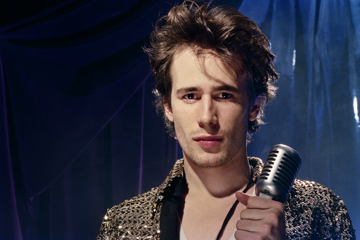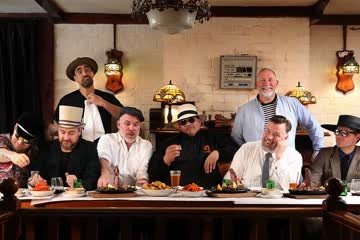The Witch Is A Stunning, Unsettling Work Of Cinematic Time-Travel
"Here, evil isn’t the trope of genre, but something all too real."
THE WITCH

The Witch is one of the great horror movies of the 21st century, largely because it rarely resembles a horror movie. Robert Eggers’ bracing debut is a work of stunning cinematic time-travel, rendering a 17th-century, Puritan New England all-encompassing in its verisimilitude. Shot in the remote woodlands of rural Ontario, Eggers and DOP Jarin Blaschke filmed using only natural light; the film all slate greys, looming clouds, taking place barely out of darkness. Working from court records of the Salem witch trials, Eggers authors profound period dialogue; though set in the ‘new world’, it is spoken as if in the old.
This obsession with historical accuracy isn’t just a form of cinematic fetishry, or attempt at singular stylisation. Eggers is so devoted to the period that he dares depict the distant past with no historical revisionism; no winking concessions to a knowing modern audience. Instead, he accepts the beliefs of the era at face value: presenting the religious paranoia and hysteria on screen not as commentary, but sustained milieu. Here, evil isn’t the trope of genre, but something all too real.
Don't miss a beat with our FREE daily newsletter
The Witch finds a family — father (Ralph Ineson), mother (Kate Dickie), daughter (Anya Taylor-Joy), son (Harvey Scrimshaw), mischievous young twins (Lucas Dawson, Ellie Grainger) — banished from a Calvinist community for “prideful conceit”. In their exile, they settle on the edge of a dark forest that they believe harbours ill spirits, and the presence of the devil. When their newborn-infant disappears in the care of Taylor-Joy, the family is beset by mistrust, suspicion, blame. Taylor-Joy’s nascent sexuality makes her an easy scapegoat; their puritanical beliefs regard her body as being barely removed from evil, flesh rich with temptation and susceptible to weakness.
As the family turns against each other, this initial tragedy feels like the release of poison; slowly trickling in, turning their family farm toxic, tragic. Here, God isn’t a source of comfort, but figure of wrath; an angry deity who has sent them suffering as punishment for their sins. Nature, in turn, is hostile, feminine, forbidding; the family’s black goat a soldier of Satan, the woods a portal to the darkness. Eggers embraces their superstitions as truth, lets their cloistered, archaic worldview dictate a drama that, slowly, surely, turns more horrifying, and builds to a genuinely-audacious ending. It’s an unsettling, unique piece of horror that barely belongs to the genre; The Witch a masterpiece of sustained mood-building and meticulous world-building.
THE DAUGHTER

The Daughter is a local adaptation of a play by Ibsen, but it owes far more to Festen. Simon Stone’s directorial debut is one of those secrets-and-lies family dramas, where the black sheep of the family (here, Paul Schneider) returns to the small town he long ago left far behind, drawn back by a grand family event (here, a wedding; though funerals, birthdays, and anniversaries oft serve as the same device). And, as convention demands, his return dredges up the past, skeletons eventually tumbling out of the family closet, the film slowly building towards the much-anticipated great revelation.
Of course, The Daughter effectively signals its great secret-and-lie in its title; Stone abandoning the title of the original, The Wild Duck, just as he freely adapts its text. The story’s no longer set in Bergen parlours, but in a failing logging town in some non-specific Australian woodlands; shot in the Snowy Mountains in a palette of cool blues and greys. The family Schneider’s returning to has owned the mill for generations, but it’s set to close; a weighty symbol for a film about lineage. His dad (Geoffrey Rush) is getting hitched to the hired help (Anna Torv), bringing up old angst about the long-ago suicide of his mother, and the paternal affair that drove her to it. Simultaneously, Schneider falls in with an old pal (a great Ewen Leslie), his teenaged daughter (a just-as-great Odessa Young) and sweet wife (Miranda Otto). Their family life at first seems perfect and loving, but soon the secrets-and-lies behind it, too, come to bear; happy families and sad families both founded on deception. With inevitability, confrontation emerges, and Chekhov’s-gun-adherent tragedy looms.
As debutant director, Stone delivers a string of strong images; like a great single-take of Leslie, enraged, stalking through the sprawling wedding soirée. But he also over-uses a maddening, borderline-embarrassing device of montaging jump-cuts under the one piece of dialogue; assumedly trying to create a dislocated air but just seeming restless, unsure, or like he’s patching together various takes rather than settling on one.
Ultimately, The Daughter is an actor’s piece; and the rapport, banter, and wide-ranging performances from Leslie and Young are, in their own way, worth the price of admission. But in spite of —or even because of— all its sterling acting, the film has a stagey, theatrical feeling that it can never transcend; this actor’s-piece always feeling like actors acting, disbelief never close to being suspended.
A BIGGER SPLASH

Luca Guadagnino’s films are rarely restrained: from the teen-BDSM hysteria of Melissa P. to the operatic I Am Love, the Italian filmmaker has shown no tendency towards restraint. The images are rapturous, the music loud, the performances big, the emotions melodramatic. So, it’s hardly a surprise that his remake of Jacques Deray’s La Piscine is bright, bold, enthusiastic, and ultimately a little silly.
It starts in total silence: Tilda Swinton, an iconic rocker who’s lost her voice, and Matthias Schoenaerts, her younger lover, recuperating on Pantelleria, a remote Sicilian isle off the Tunisian coast. Yet, their calm is interrupted by an annoying ring-tone, which heralds the arrival of Ralph Fiennes, a rambunctious bon vivant whose constant stream of babble betrays his life-of-the-party, fuck-anything-that-moves ways. He crashes their slice of quiet paradise, bringing along the daughter he’s just discovered, bitchy American teen Dakota Johnson. From there, as in the original, there’s plentiful flesh by the swimming pool — if you’ve ever wanted to see Fiennes going tackle-out, be prepared for an ongoing eyeful — and, soon enough, mounting sexual-tension and psychological game-playing.
Guadagnino revels in the specific landscape: Pantelleria serving as active, antagonistic presence, not scenic backdrop. He also lovingly fetishises the Rolling Stones, vinyl, rock’n’roll lore, and boozy sing-alongs; though past-timeframe scenes in which Swinton is shown in studio and on stage — as rockstar part Marianne Faithfull, part David Bowie — don’t quite work. The same can be said of the whole. A Bigger Splash is fabulously acted, carefully observed, and lovingly-photographed, but its story, its drama, never quite sticks; with the final-act arrival of the original’s genre machinations seeming perfunctory, and contrary to all that’s come beforehand.
EYE IN THE SKY

Eye In The Sky is a thriller about a drone strike. Its one-line-synopsis simplicity, though, betrays a movie of much complexity. Gavin Hood’s film — which is made of much better stuff than 2007’s overblown CIA-torture drama Rendition — begins by introducing us to our essential protagonist, Helen Mirren, an MI colonel who’s spent years tailing that ultimate villain: a white Westerner who’s converted to militant Islam. Finally, the stars have aligned and a trio of most-wanted targets and two fresh-off-the-boat suicide-mission-ready recruits — one American, one British — are holed up in the one house, in a Muslim stronghold in Nairobi. Tasked with actually pushing the drone-strike button is Aaron Paul, an all-American fighter pilot who ‘flies’ at a computer on a base in the Nevada desert. He’s spent countless hours watching from on high like a God, but never rained down fire from the sky.
In a simpler film, Mirren’s ballbreakin’, day-seizing dame and Paul’s man-of-mettle would be made heroes, everyone else supporting players in their drama. Maybe they’d have tortured back-stories, dark pasts that would have to be overcome, penances to be paid. But, in Eye In The Sky, there’s none of that. Instead, our two leads are just a pair of people who’ve shown up to work; two in a sea of many, the principles of a vast ensemble.
There’s Paul’s co-workers, like fresh-faced Phoebe Fox and commanding colonel Hood (the director himself); and Mirren’s, like by-the-book toff John Heffernan and unsure Babou Ceesay. There’s Kim Engelbrecht, immaculately eyebrow’d, running facial-recognition scans from Hawaii. There’s the late Alan Rickman as a British General sitting down in a governmental board-room with the political players — Jeremy Northam, Richard McCabe, Monica Dolan — who must have their say; and who must run decisions by higher-ups, including a defence minister (Iain Glen) in Singapore otherwise gastrically ‘indisposed’.
Then there’s those on the ground. Like the local Kenyans of the operation: Barkhad Abdi (essentially an undercover operative who must head into the danger zone), Ebby Weyime, Lemogang Tsipa. And, a non-fundamentalist family (Aisha Takow, Faisa Hassan, Armaan Haggio) who, by proximity to the ‘target’ in question, will be caught in any crossfire. Takow is a nine-year-old girl who must learn and play in secret —both things forbidden by the local fundamentalist fanatics— and, thus, the immediate centre of audience sympathy. So, when she sets up her family’s bread stand right by the proposed detonation site, her life suddenly occupies the audience’s hearts, and the film’s central drama.
Knowing that “a sweet little girl” (as Rickman wryly puts it) could be collateral damage in this drone-strike incites the film’s moral, political, and PR-centric debates; its vast cast of characters essentially occupying all points of the chain of command, and having varying perspectives on the ‘right’ thing to do. Guy Hibbert’s screenplay, gladly, doesn’t demand the audience take any side. Instead, it shows the wide-ranging ramifications of these new-millennial acts-of-war, and lets it sit uneasily with you.







